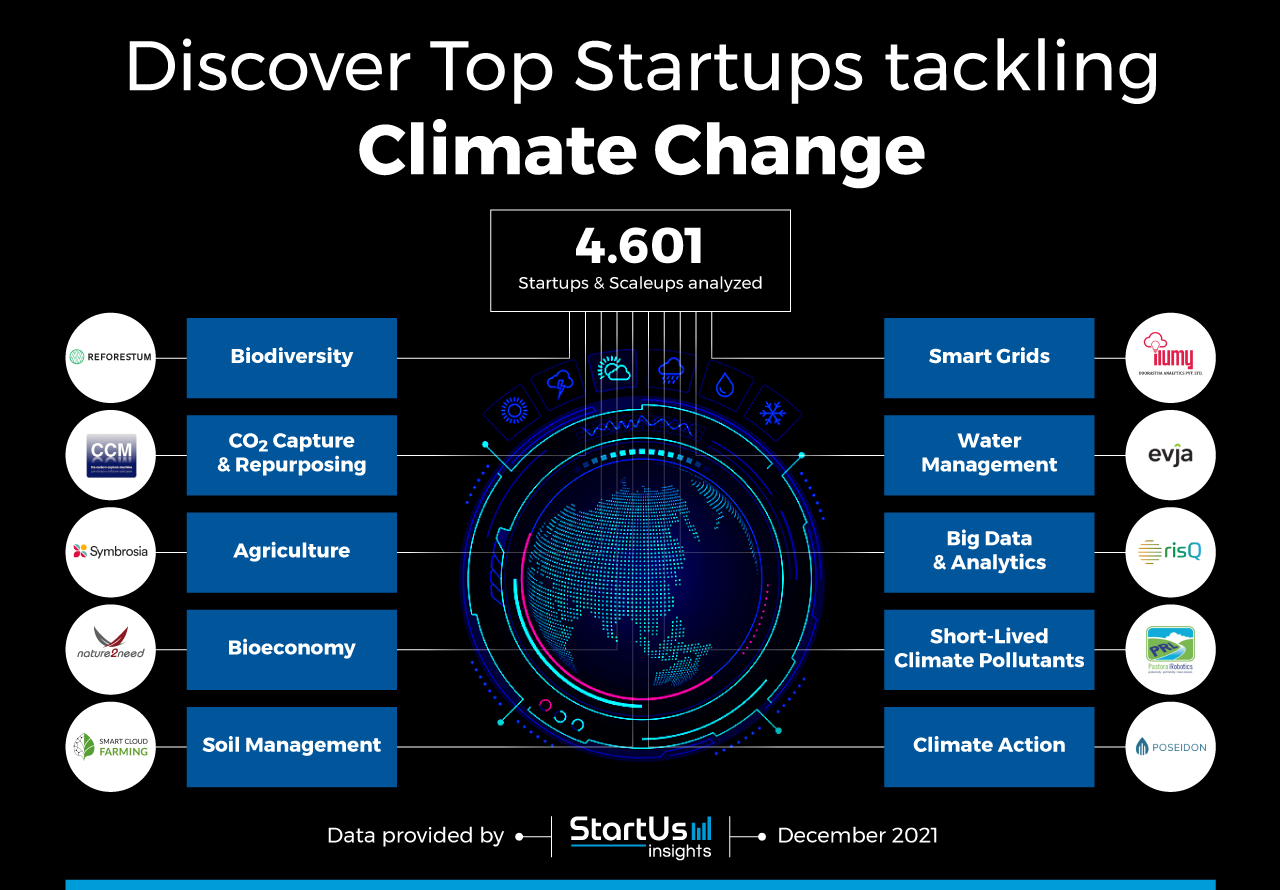Staying ahead of the technology curve means strengthening your competitive advantage. That is why we give you data-driven innovation insights on sustainability and climate. This time, you get to discover 10 hand-picked startups across 10 different industry trends tackling climate change.
Innovation Map highlights Global Startups tackling Climate Change
For this in-depth research on the Top Decarbonization Trends & Startups, we analyzed a sample of 4 600+ global startups and scaleups. These insights are derived by working with our Big Data & Artificial Intelligence-powered StartUs Insights Discovery Platform, covering 2 093 000+ startups & scaleups globally. The platform quickly delivers an exhaustive overview of emerging technologies within a specific field as well as identifies relevant startups & scaleups early on.
In the Innovation Map below, you get an overview of the 9 industry trends tackling climate change as well as 10 startups enabling this. This research gives you data-driven innovation intelligence that improves strategic decision-making by giving you an overview of emerging technologies & startups increasing transparency and productivity.
Climate Change Startups & Trends
1. Biodiversity
Climate change is impacting biodiversity around the world. Conversely, efforts to restore biodiversity lost to human activities have the potential to reverse climate change. Biodiversity hotspots, both on land and oceans, are massive carbon sinks. Sustainable solutions that preserve or restore solutions, thereby, could lower the amount of carbon dioxide and methane in the atmosphere. Some biodiversity conservation solutions include:
- Habitat Monitoring
- Sustainability Management
- Agroforestry
- Forest Monitoring
- Biodiversity Databases
Reforestum advances Agroforestry
Reforestum is a Spanish startup that develops a remote monitoring system for agroforestry. The monitoring system uses satellite images and radar data as inputs and deep learning models to infer the quality of the forests and the carbon stocks in that area. The startup also enables corporate firms and individuals to offset their emissions through reforestation, afforestation, and biodiversity conservation. It allows companies to calculate their carbon footprint and visualize the impact of their offset contributions to fight climate change.
Explore our data-driven report of 5 top biodiversity solutions out of 300+.
2. CO2 Capture and Repurposing
The increase in the amounts of CO2 in the atmosphere over the last century is the major driving factor behind climate change. While most sustainable solutions limit carbon emission, some startups are developing technology to extract CO2 from the atmosphere. Using circular economy principles, CO2 repurposing solutions convert carbon dioxide into valuable products for different industries, including food, manufacturing, and chemicals. Some CO2 capture and repurposing solutions include:
- Small-scale Carbon Capture
- Carbon Nanofibers
- Bio-Based Proteins
- Building Materials
- Carbon-negative Feedstock
Carbon Capture Machine produces Carbon-negative Feedstock
British startup Carbon Capture Machine develops machines that convert emitted CO2 into carbon-negative feedstock to reverse climate change. The startup dissolves CO2 from any source into dilute alkali to convert it into carbonate ions. The carbonate solution reacts with abundantly available Ca++ and Mg++ ions from brines including waste desalination brine, production and formation brine from oil and gas, and connate brine. The carbon-negative precipitated calcium carbonate (PPC) feedstock finds applications in the manufacture of paper making, plastics, paints, adhesives, cement, and concrete.
Meet the 5 top CO2 capture and repurposing solutions tackling climate change.
3. Climate-Friendly Agriculture
The agriculture sector uses a large amount of water, land, polluting agrochemicals, and other resources. To make it more sustainable, startups offer solutions that lower the utilization of one or more of these inputs. Sustainable agriculture startups are adopting a range of circular solutions that improve resource utilization as well as reduce the industry’s impact on climate. Some climate-friendly agriculture solutions include:
- Biomass Recycling
- Cultured Meat
- Sustainable Feed
- Methane Emission Reduction
- Sustainable Agrochemicals
Symbrosia enables Livestock Methane Emission Reduction
US-based startup Symbrosia enables livestock methane emission reduction. The startup uses the Asparagopsis taxiformis seaweed to block hydrogen from carbon during the digestion phase, reducing methanogens naturally. The startup’s seaweed is a sustainable feedstock produced using bioremediate waste from fish farms without requiring freshwater. Also, Symbrosia uses renewable energy to process the seaweed into animal feed. Spraying the startup’s seaweed into cattle feedstock improves the animals’ growth rate as well as reduces methane emissions. This enables animal farmers to save costs on feedstock and improve sustainability.
Read our analysis of 5 top startups advancing climate-friendly agriculture out of 300+ solutions.
4. Bioeconomy
Conventional products, such as the range of materials derived from petroleum, are polluting at one or another stage in their life cycles. Bioeconomy replaces polluting materials such as plastics or metals with biobased materials derived from plants or microbes. Startups also upcycle biological waste feedstock from the agriculture and food industries into fuel, feed, and valuable chemicals. Some bioeconomy solutions for lowering the carbon footprint of industries are:
- Lignin Recovery
- Algae-based Food
- Waste-to-Energy
- Biopolymers
- Biobased Chemicals
nature2need produces Sustainable Biopolymers
German startup nature2need offers sustainable biopolymers. The startup’s materials have a low carbon footprint and come ready to use for applications in various sectors. Besides, it works to shift a linear process into a circular economy by sourcing natural fibers, minerals, fillers, and recycled organic waste streams to develop its products. nature2need reduces the environmental impacts caused by manufacturing operations as well as aids transition to a bioeconomy.
Discover 5 top bioeconomy solutions tackling climate change out of 1 400+.
5. Soil Management
Though not as visibly evident as air or water pollution, soil pollution impacts biodiversity and food systems. Soil management practices preserve and restore soil quality lost to agriculture and other polluting activities. Startups combine technologies ranging from geospatial intelligence and spectroscopy to sensors to enable sustainable soil management. Among other solutions, soil management startups provide these solutions to tackle climate change:
- Soil Mapping
- Regenerative Farming
- Sustainable Agriculture
- Soil Remediation
- Soil Analysis
SmartCloudFarming offers Soil Analytics
German startup SmartCloudFarming offers advanced soil analytics solutions based on remote sensing, ground data, and deep learning. To simplify soil management, the startup develops a remote soil management dashboard powered by its proprietary 3D digital soil moisture and nutrient maps. The startup’s soil organic carbon monitoring algorithm uses remote sensing data and advanced climate science research to help make informed decisions regarding soil management and carbon storage.
Find more about 5 top soil management startups out of 500+ solutions.
6. Smart Grids
The energy industry contributes to global warming not just with polluting energy production, but during its distribution as well. Smart grids optimize energy distribution as well as enable the integration of renewable energy solutions. By decentralizing energy production, the technology also incentivizes sustainability in the industry. Some smart grid solutions for businesses and homeowners include:
- Renewable Energy Storage
- Microgrid Energy Storage
- Energy Management
- Grid Monitoring
- Grid Optimization
Doorastha enables Smart Grid Monitoring
Indian startup Doorastha creates grid controllers, monitors, and software to manage clean energy production and distribution for small grids. It allows operators to track power generation and storage consumption, as well as optimize system performance. The startup’s iLUMY smart meter monitors energy usage at the consumer end of a microgrid. Then, the startup’s Enabler App allows consumers to manage smart meters and pay for electricity.
Explore 5 top smart grid startups tackling climate change out of 100+.
7. Water Management
By disrupting the water cycle, Climate change threatens both the availability and quality of drinking water. To prevent this, robust water management solutions allow cities to better manage water. Efficient water utilization and recycling techniques allow companies to lower their footprint while saving water. Startups also offer water monitoring and recovery solutions aimed at specific industries such as agriculture and utilities. Some water management solutions include:
- Water Recovery
- Sustainable Water Monitoring
- Smart Water Storage
- Urban Floodwater Recycling
- Agricultural Water Management
Evja offers Agricultural Water Management
Italian startup Evja develops a solar-powered agricultural water management system. It utilizes smart agriculture sensors, AI, and advanced agronomic models. The wireless sensors track air humidity, air temperature, leaf wetness, solar radiation, CO2, and soil moisture to enable real-time agriculture climate and soil monitoring. The system then suggests optimal irrigation for improving farm water management. Evja’s solution enables AgriTech companies to make better decisions, deal with climate change, and increase yield while lowering the environmental impact.
Find out more about 5 top water management startups impacting climate change out of 500+.
8. Big Data & Analytics
Organizations, businesses, and civic authorities generate large amounts of data on all kinds of activities. Startups and scaleups analyze this data to find opportunities to reduce emissions. For example, measuring the carbon impact of each activity allows businesses to prioritize their sustainability actions. Other big data & analytics-driven solutions addressing the climate crisis include:
- Climate Action Planning
- Financial Risk Modeling
- Carbon Impact Intelligence
- Natural Ecosystem Monitoring
- Environmental Intelligence
risQ provides Financial Risk Modeling
US-based startup risQ develops a financial risk management platform for municipal bond market issuers, investors, and other stakeholders. The startup’s big data analytics tools utilize geospatial machine learning (ML), climate science, and catastrophe simulations. The startup’s solutions transform climate fluctuation data into financial indicators that consequently signify opportunities for both profits and sustainability.
Read a data-driven report on 5 top big data & analytics solutions addressing climate change.
9. Short-Lived Climate Pollutants (SLCPs)
SLCPs don’t last as long as CO2 in the atmosphere, but their impact on global warming is far greater. Different kinds of SLCPs find applications in industries ranging from manufacturing and energy to consumer products. To reduce their use, startups are developing new materials and processes that replace them with sustainable alternatives. Some SLCPs that startups are tackling with sustainable innovations include:
- Sulfur Hexafluoride
- Perfluorinated Compounds
- Nitrous Oxide
- Nitrates
- Hydrofluorocarbons
Pastoral Robotics treats Nitrate Leaching
Pastoral Robotics is a New Zealand-based scaleup that offers Spikey, a solution to prolong nitrate retention in the soil surface and allow grass to use it for longer periods. Spikey utilizes electrode disks that allow fast and accurate fresh urine patch detection. Upon detection of nitrate, the solution automatically dispenses the scaleup’s nitrification inhibitor, NitroStop. The application of NitroStop to urine patches allows dairy farmers to capture the available nitrogen to grow more pasture. The solution treats nitrate leaching and nitrous oxide emissions at the source, improving the sustainability of animal agriculture.
Discover 5 top startups tackling SLCPs out of 100+ solutions.
10. Climate Action
United Nations Sustainable Development Goals (SDGs) are 17 interrelated goals that guide organizations and governments towards sustainability. While many of these goals address climate change, SDG 13 — Climate Action — focuses specifically on it. Startups are building solutions to allow individuals and businesses to measure and limit their carbon footprint. Some solutions that advance the UN SDG #13 include:
- Climate Subscriptions
- Emissions Tracking
- Carbon Offsetting
- Consumer Powered Climate Balance
- Climate Finance
Poseidon enables Consumer Powered Climate Balance
Singaporean startup Poseidon enables consumer powered climate balance by focusing on everyday actions. The startup’s solution, reduce, uses Artificial Intelligence and blockchain to analyze the carbon footprint of any product or service. It then purchases an equivalent amount of carbon credits, rebalancing the carbon impact of the product. The startup supports projects in forest conservation, reforestation, and sustainable agriculture.
Find out the 5 top startups taking climate action out of 500+ solutions.
Discover the Latest Decarbonization Startups
As consumers become increasingly climate-conscious, new startups and technologies address the need for sustainable materials and processes. These solutions span a range of applications across the industries ranging from agriculture and food to energy. These solutions include carbon offsetting, sustainability management, and ecosystem restoration, among others. Circular economy and sustainability trends are also reversing the impact of climate change. To move away from polluting materials, startups are incorporating low carbon and/or biobased materials.
Get in touch to identify specific startups & solutions that allow your business to take the fight against climate change to the next level.









